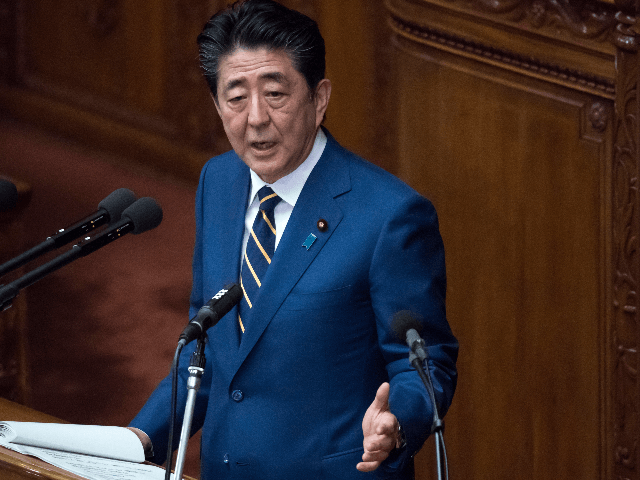Prime Minister Abe Shinzo of Japan condemned the World Health Organization (WHO) on Thursday for excluding the nation of Taiwan from the response to China’s new coronavirus outbreak “for political reasons,” suggesting it makes the world less safe.
Taiwan is an independent state that has never been governed by the People’s Republic of China, yet China insists on imposing its “One China” policy on the world, making it mandatory not to recognize Taiwan’s sovereignty for any country or entity that wishes to have diplomatic ties with it. As China is a member of the WHO, it forces the United Nations body to excluded Taiwan. While previously allowing Taiwan to participate as an “observer” in the health group, China forced the WHO to expel the country following its election of President Tsai Ing-wen in 2016. Largely in part to China’s growing belligerence against Taiwan, Tsai was re-elected in a landslide this month.
Only 15 countries formally recognize Taiwan as a state, not including Japan or the United States. Yet Abe nonetheless warned that, in the face of an outbreak that is increasingly impacting thousands of people in Asia, coordination with Taipei will be necessary.
“It will be difficult to maintain health and prevent further infections in this region if (Taiwan) is excluded for political reasons,” Abe said in remarks following a legislative session in Tokyo, according to Japan’s Kyodo News. “We will continue to make our country’s stance clear at the WHO.”
The WHO has held at least two meetings on China’s coronavirus outbreak, which began in the central city of Wuhan in mid-December, experts estimate, but the Communist Party did not make an official announcement until January 20. After the first one at the beginning of this week, WHO Director-General Tedros Adhanom Ghebreyesus said he was not convinced the outbreak was an international emergency because of the low number of known cases outside China’s borders (the WHO considers Taiwan, Hong Kong, and Macau part of China). By Thursday, Tedros announced the U.N. body would, in fact, deem the outbreak a Public Health Emergency of International Concern, triggering global mechanisms to attempt to prevent the virus from spreading further.
At press time, global health officials have documented 9,910 cases of the novel coronavirus worldwide. Among those affected, 213 have died, all of them in China. Taiwan has logged nine cases of coronavirus while Japan, the first foreign location to identify a case, currently has 14.
The new coronavirus is believed to have jumped from animals to humans at a wild meat market in Wuhan. The virus is part of the same family of viruses as the common cold and the virus responsible for the deadly Sudden Acute Respiratory Syndrome (SARS), which killed nearly 800 people in 2003. There are now already more documented cases of the 2019 coronavirus as there were during the entirety of the SARS outbreak.
Japan joined a growing chorus of voices demanding respect for Taiwan’s sovereignty in the face of the outbreak, noting that Taipei, in a critical geopolitical location and home to highly trafficked airports, can be a key point of contact for the outbreak to spread globally, making it an important actor in the viral response.
“Short-term or myopic considerations must not be permitted to impede international information exchange, consultation and collective action,” an official statement from the embassy of St. Lucia in Taiwan, one of 15 nations to recognize Taiwan’s sovereignty, said in a statement on Thursday, demanding the WHO allow Taiwan to participate.
Seven U.S. senators, all Republicans, also sent a letter personally to Tedros urging the WHO to reconsider its stance on Taiwan given the current outbreak. Sen. Cory Gardner (R-CO) sent the letter as chairman of the Senate Foreign Relations Subcommittee on East Asia, the Pacific, and International Cybersecurity Policy, which specifically looks at the U.S.’s role in the region.
WHO officials have dismissed concerns by insisting that it coordinates with Beijing, which it claims can act on Taiwan’s behalf.
“I believe there have been joint missions and joint approaches to the response, so I would characterize, from our perspective, that there is technical cooperation going on between provinces in China and between WHO and any of those entities that seek our assistance,” Michael Ryan, executive director of WHO Health Emergencies Program, told reporters last week after being pressed to explain Taiwan’s exclusion.
Taiwan has no political or other coordination with China. China has explicitly not shared key health information with Taiwan’s government, as it deems it illegitimate.
“Like all other countries, Taiwan is currently facing the risk from this global pandemic,” President Tsai said on Thursday, once again demanding her country’s rightful place in the global public health organization. “We have the capability and the responsibility to do our part for the international community, and we hope that the WHO will not exclude Taiwan for political reasons.”
“The WHO must make room for Taiwan’s participation. … The coronavirus outbreak in Wuhan, China has made it clear to the world just how important Taiwan is to disease prevention efforts,” she emphasized.

COMMENTS
Please let us know if you're having issues with commenting.